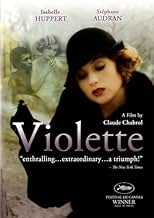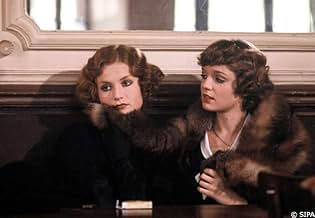In einem Zwischenkriegsfrankreich, das mit tiefgreifenden sozialen und politischen Veränderungen zu kämpfen hat, rebelliert die 18-jährige Violette Noziere gegen die Zwänge ihrer klaustropho... Alles lesenIn einem Zwischenkriegsfrankreich, das mit tiefgreifenden sozialen und politischen Veränderungen zu kämpfen hat, rebelliert die 18-jährige Violette Noziere gegen die Zwänge ihrer klaustrophobischen, arbeiterfreundlichen (und möglicherweise inzestuösen) Familie, mit beunruhigenden... Alles lesenIn einem Zwischenkriegsfrankreich, das mit tiefgreifenden sozialen und politischen Veränderungen zu kämpfen hat, rebelliert die 18-jährige Violette Noziere gegen die Zwänge ihrer klaustrophobischen, arbeiterfreundlichen (und möglicherweise inzestuösen) Familie, mit beunruhigenden Folgen.
- Auszeichnungen
- 2 Gewinne & 5 Nominierungen insgesamt
- Germaine Nozière
- (as Stephane Audran)
- Le musicien noir
- (as Grégory Germain)
Empfohlene Bewertungen
Incidentally, the film seems to have been made as part of a two-picture deal (along with BLOOD RELATIVES [1978]) between France and Canada. Anyway, it led 23-year old Isabelle Huppert (though the character she plays is actually only supposed to be either 14 or 18, depending on the sources!), an award winner at Cannes, towards acquiring the well-deserved status of her country's premiere actress she retains to this day.
Chabrol tackled melodrama only occasionally and seldom with success: on the one side, we can cite THE BREACH (1970) and the afore-mentioned STORY OF WOMEN (also with Huppert) and, among those that did not work out quite as well as had been anticipated, one can name – alongside the film under review – the somewhat unnecessary adaptation of MADAME BOVARY (1991; in which Huppert had the title role yet again). The problem here lies with the story itself (to escape her stifling petit bourgeois existence, a girl – whose promiscuity had already given her syphilis – poisons both her parents), which is simply not all that interesting and, stretched to slightly over two hours, the effect rings even more hollow!
Still, to redress the balance, the film is imbued with the director's customary exactitude of period detail (it is set in the 1930s) and characterization (even if the protagonist hardly arouses our sympathy throughout, especially when accusing her late father of incestuous conduct to justify her own actions!) – but also unusually featuring a handful of quirky interpolated flashbacks. The strong supporting cast includes such Chabrol fixtures as Stephane Audran (at 45, heading definitely towards middle-aged roles though here she is still able to express her sexuality), Jean Carmet (by far his largest role for this director), Mario David and Bernadette Lafont (appearing towards the end as Violette's cellmate), as well as Francois Maistre (a Luis Bunuel regular) and Fabrice Luchini.
This is is a good movie except one thing kept bothering me. Isabelle Huppert looks too old. The story is based on a real girl who poisoned her parents at the age of 18. I never saw Violette as a teen. In fact, Isabelle Huppert looks 30 in her hooker makeup. I couldn't figure out why a 30 year old is living with her parents and acting like a kid hiding her makeup. I wondered if it's matter of the era she's living in. It's an easy fix if the movie lay out her age in an obvious way. She could have a birthday party. It throws the whole dynamic of the story and the family into confusion. The story really requires a younger actress to play this role. Otherwise, I like the performances but the age difference is really problematic.
"Violette Nozière" (1978) is the true story of a French psychopath in the 30's by Claude Chabrol. The plot is ambiguous in many moments, mostly regarding the accusation of incest. But the film induces the viewer that Violette is a cold-blood murderer, ambitious and in love with a pimp. Isabelle Huppert ii excellent, as usual, in her first work with Chabrol. My vote is seven.
Title (Brazil): "Violette"
What makes the film so gravely provocative is the entire scheme of Violette (Huppert) seems so juvenile and wanton, the viciousness is inexorable and beyond any logical solace. Violette is a lackadaisical, apolitical and promiscuous teenager, although at the age of 24, Huppert is unbecoming to pass for the role, but Chabrol adroitly restyles Violette with a more precocious patina, the dexterous transition between the good girl veneer when she is with her parents and the motel-hogging and man-hunting hussy potently incites Huppert's chameleonic escapade, each and every single frame zooms in on her unprovoked aloofness and obtrusive sex appeal. She is perpetually indulging in her own pathetic realm, sneers at her parents' clumsy intercourse and disgruntled at their ordinary petit bourgeois trivia, she is in an impetuous situation to find an egress, but the man in her dreams is a major disappointment as viewers all being well- informed in advance, it is money he is on the lookout for. The affair is doomed to futility, in some sense Violette knows it fairly well, but it is the defects (the egocentric selfishness, deep- rooted misanthrope and diabolic cruelty) in her character blind her sight, poison her mind and abet her into carrying on the abhorrent action.
After the murder plan goes as expected and the lousy gas-accident cover-up, Germaine, the mother (Audran) survives the poison, it is not a detective story after all, instead, it is an awkward moment of facing the truth, but Violette's vituperative accusation to her late father (Carmet) in order to justify her motive shatters all the expectation if there is any mercifulness left in her, she is an archetype of the malevolent side of human nature, an anomaly which defies all the logical interpretation, she and Dr. Hannibal Lecter can be an adorable couple!
Stéphane Audran, whom I just appraised for her delicate performance in BABETTE'S FEAST (1987, 8/10), is astounding here as the overbearing but doting mother of Violette, she is the one we can mostly project our compassion on, yet, we might also prompt to question her tutelage, perhaps she is at least partially responsible for the decadence of her sole daughter, how Violette's double act (constantly stays in motels and hangs out someone the parents have never met) can blatantly evade a mother's instinctive nature is a shade bemusing, not to mention the intaking of unknown medicine for the sake of hereditary syphilis, at least verify with the doctor first (and in this case, both parents are too unmindful)!
New to the canon of Claude Chabrol, the pick of VIOLETTE may not be the optimum starter, the disrupted narrative never fully register any excitement barring a bitter aftertaste and shocking values of the subject matter, its foremost merit is to grant Huppert a stage to unleash her glacial pulchritude, which one can appreciate from every unyielding close-up on her, and comfortingly augurs an eminent career for her as crème de la crème of the French cinema, her screen magnetism is inherent.
Wusstest du schon
- WissenswertesReceived an HD restoration from the original negatives in 2018 by Eclair labs through the support of Arte France's Cinema Unit and René Chateau Video.
Top-Auswahl
- How long is Violette?Powered by Alexa
Details
- Erscheinungsdatum
- Herkunftsländer
- Sprache
- Auch bekannt als
- Violette
- Drehorte
- Rue Santos-Dumont, Paris 15, Paris, Frankreich(Violette and Jean in the street, making plans)
- Produktionsfirmen
- Weitere beteiligte Unternehmen bei IMDbPro anzeigen
Box Office
- Budget
- 1.360.000 CA$ (geschätzt)
Zu dieser Seite beitragen



































